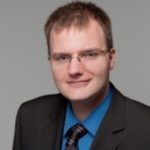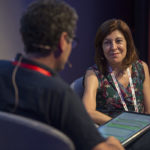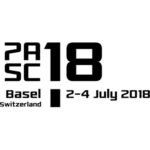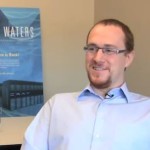David Bader from Georgia Tech gave this talk at PASC18. “Emerging real-world graph problems include: detecting and preventing disease in human populations; revealing community structure in large social networks; and improving the resilience of the electric power grid. Unlike traditional applications in computational science and engineering, solving these social problems at scale often raises new challenges because of the sparsity and lack of locality in the data, the need for research on scalable algorithms and development of frameworks for solving these real-world problems on high performance computers, and for improved models that capture the noise and bias inherent in the torrential data streams.”
Extreme Scale Deep Learning at NERSC
Thorsten Kurth from LBNL gave this talk at the PASC18 conference. “We present various studies on very large scale distributed deep learning on HPC systems including the ~10k node Intel Xeon-Phi-based Cori system at NERSC. We explore CNN classification architectures and generative adversarial networks for HEP problems using large images corresponding to full LHC detectors and high-resolution cosmology convergence maps.”
PASC18 Conference Grows in Attendance and Scope
Over at CSCS, Simone Ulmer writes that more than 400 scientists from all over the world met in Basel in early July for PASC18. With more than 200 talks centered around the conference theme of “Fast and Big Data, Fast and Big Computation” 400 attendees enjoyed the exchange of knowledge in the area of Scientific Computing and Computational Science.
Microsoft Powers the Move to the HPC Cloud at PASC18
In this video from PASC18 in Basel, Dr. Lukasz Miroslaw from Microsoft describes how the company is helping customers move HPC & Big Compute workloads to the Cloud. “High performance computing, artificial intelligence, and other advanced workloads are increasingly important to companies across all industries. But rapid changes in technology and workloads make it challenging for HPC teams to provide the resources their users need. Microsoft Azure provides one cloud for every HPC workload so that users can get the resources they need when they need them and only pay for what’s used.”
The Colourful Theory: Visible and Invisible Matter in the Universe
“Chromodynamics helps us understand our universe. The strong interaction is one of the four forces describing complex phenomena in the evolution of the universe from the quark gluon plasma formed just after the Big Bang at the birth of the cosmos to the formation of neutron stars. The bulk of visible matter in the universe is due to the strong interaction and understanding its properties requires the solution of quantum chromodynamics (QCD).”
Unravelling Earthquake Dynamics through Extreme-Scale Multiphysics Simulations
Alice-Agnes Gabriel gave this talk at the PASC18 conference. “Earthquakes are highly non-linear multiscale problems, encapsulating geometry and rheology of faults within the Earth’s crust torn apart by propagating shear fracture and emanating seismic wave radiation. This talk will focus on using physics-based scenarios, modern numerical methods and hardware specific optimizations to shed light on the dynamics, and severity, of earthquake behavior.”
Dr. Eng Lim Goh from HPE to keynote PASC18 in July
Today PASC18 announced that Dr. Eng Lim Goh from HPE will deliver a keynote presentation on scientific computing. Registration is now open for the conference, which takes place July 2-4 in Basel, Switzerland. “Traditionally, scientific laws have been applied deductively – from predicting the performance of a pacemaker before implant, downforce of a Formula 1 car, pricing of derivatives in finance or the motion of planets for a trip to Mars. With artificial intelligence, we are starting to also use the data-intensive inductive approach, enabled by the re-emergence of machine learning which has been fueled by decades of accumulated data.”
Speakers Announced for PASC18 in Basel
The PASC18 conference has posted their conference speaker agenda. Registration is now open for this HPC event, which takes place July 2-4 in Basel, Switzerland. “PASC18 offers three days of stimulating technical sessions with more than 200 talks in total. The program includes keynote presentations, minisymposia, peer-reviewed papers, posters, an interdisciplinary dialogue, and a panel discussion.”
David Bader from Georgia Tech Joins PASC18 Speaker Lineup
Today PASC18 announced that this year’s Public Lecture will be held by David Bader from Georgia Tech. Dr. Bader will speak on Massive-Scale Analytics Applied to Real-World Problems. “Emerging real-world graph problems include: detecting and preventing disease in human populations; revealing community structure in large social networks; and improving the resilience of the electric power grid. Unlike traditional applications in computational science and engineering, solving these social problems at scale often raises new challenges because of the sparsity and lack of locality in the data, the need for research on scalable algorithms and development of frameworks for solving these real-world problems on high performance computers, and for improved models that capture the noise and bias inherent in the torrential data streams. This talk will discuss the opportunities and challenges in massive data-intensive computing for applications in social sciences, physical sciences, and engineering.”
SC18 Papers Submissions Open Today with New Review Process
In this special guest feature, SC18 Papers Chair Torsten Hoefler from ETH Zurich writes about big changes to the conference papers program. It’s timely news as SC18 Paper Submissions open today. “In the light of this year’s “HPC Inspires” theme, we are looking forward to working with the technical papers team to make SC18 the best technical program ever and consolidate the leading position of the SC Conference Series in the field of HPC.”













